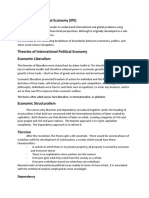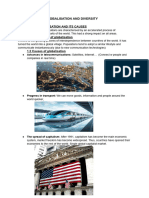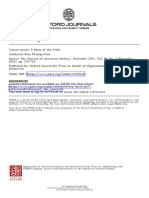0 ratings0% found this document useful (0 votes)
9 viewsPresentation Hahahaha
Presentation Hahahaha
Uploaded by
pauloematacalumpianofdsffsdf
Copyright:
© All Rights Reserved
Available Formats
Download as PPTX, PDF, TXT or read online from Scribd
Presentation Hahahaha
Presentation Hahahaha
Uploaded by
pauloematacalumpiano0 ratings0% found this document useful (0 votes)
9 views29 pagesfdsffsdf
Copyright
© © All Rights Reserved
Available Formats
PPTX, PDF, TXT or read online from Scribd
Share this document
Did you find this document useful?
Is this content inappropriate?
fdsffsdf
Copyright:
© All Rights Reserved
Available Formats
Download as PPTX, PDF, TXT or read online from Scribd
Download as pptx, pdf, or txt
0 ratings0% found this document useful (0 votes)
9 views29 pagesPresentation Hahahaha
Presentation Hahahaha
Uploaded by
pauloematacalumpianofdsffsdf
Copyright:
© All Rights Reserved
Available Formats
Download as PPTX, PDF, TXT or read online from Scribd
Download as pptx, pdf, or txt
You are on page 1of 29
POLITICAL IDEOLOGY
What is a political ideology?
• A political ideology is a set of ideas,
beliefs, values, and opinions,
exhibiting a recurring pattern. It
provides plans of action for public
policy making in an attempt to justify
explain, contest, or change the social
and political arrangements and
processes of a political community.
What is a political ideology?
• A political ideology is a certain
ethical set of ideals that explains
how society should work, and
offers some political and cultural
blueprint for a certain social
order. It focuses on type of
government and economy.
Different Political
Ideology
SOCIALISM
• Socialism is a populist economic
and political system based on
collective, common, or public
ownership of the means of
production. Those means of
production include the machinery,
tools, and factories used to produce
goods that aim to directly satisfy
human needs.
SOCIALISM
• All resources
Controlled
• Means of production
by state/
• Distribution
governmen
• Exchange
t
LIMITED:
• Common ownership
• Rights to private property
Main objective of socialism
• To eliminate Poverty
• To create a society in which
everyone has an Equal share of
resources and wealth.
Communism is a political and
economic idea that aims for a society
where all property is owned by the
community, not individuals. This
means everyone shares resources
and work together for the common
good. In the Philippines, communism
has influenced politics and society,
leading to various challenges and
HISTORICAL BACKGROUND IN THE
PHILIPPINES
• Communist Party of the Philippines (CPP):
The CPP was founded in 1968 to promote
communism in the country. It seeks to create
a society where workers and farmers have
more rights.
• New People's Army (NPA): The NPA is the
armed wing of the CPP. Since the 1970s, they
have used guerrilla tactics to fight against
the government, especially in rural areas.
Current Issues Related to
Communism in the Philippines
• 1. Ongoing Insurgency:
The NPA continues to pose challenges to the
government, especially in rural areas. This conflict often
leads to violence and affects local communities, causing
fear and displacement.
2. Human Rights Violations Both the government and
the NPA have been accused of violating human rights.
The government has faced criticism for extrajudicial
killings and wrongful detentions of suspected
communists. Meanwhile, the NPA has been accused of
harming civilians and forcing people to join their ranks.
• Capitalism is an economic system
where private entities own the
factors of production. The four
factors are entrepreneurship,
capital goods, natural resources,
and labor. The owners of capital
goods, natural resources, and
entrepreneurship exercise control
through companies. Individuals
own their labor.
• Capitalistic ownership means owners control the
factors of production and derive their income from
their ownership. That gives them the ability to
operate their companies efficiently. It also provides
them with the incentive to maximize profit. In
corporations, the shareholders are the owners. Their
level of control depends on how many shares they
own. The shareholders elect a board of directors and
hire upper-level executives to manage the company.
Capitalism requires a free market economy in order to
succeed. It distributes goods and services according
to the laws of supply and demand. The law of demand
says that when demand increases for a particular
product, its price rises. When competitors realize that
they can make a higher profit, they increase
Examples of Capitalism
• The United States is one example of capitalism, but it
doesn't rank among the 10 countries with the freest
markets, according to the Index of Economic Freedom for
2024. It bases its ranking on nine variables, including a
lack of corruption, low debt levels, and protection of
property rights. The top 10 most capitalistic countries
are: Singapore, Switzerland, Ireland, Taiwan,
Luxembourg, New Zealand, Denmark, Estonia, Sweden,
Norway. The United States has hit its lowest global rating
with a rank of 25th. Its weakest points are its massive
government spending and poor fiscal health. It's also
weak in its tax burden that restricts taxpayer freedom.
Its strongest points are labor freedom, business freedom,
and trade freedom.
What is liberalism?
• liberalism, political doctrine that takes protecting and
enhancing the freedom of the individual to be the central
problem of politics. Liberals typically believe that
government is necessary to protect individuals from
being harmed by others, but they also recognize that
government itself can pose a threat to liberty. As the
American Revolutionary pamphleteer Thomas Paine
expressed it in Common Sense (1776), government is at
best “a necessary evil.” Laws, judges, and police are
needed to secure the individual’s life and liberty, but
their coercive power may also be turned against the
individual. The problem, then, is to devise a system that
gives government the power necessary to protect
individual liberty but also prevents those who govern
from abusing that power.
General characteristics
• Liberalism is derived from two related features of
Western culture. The first is the West’s preoccupation
with individuality, as compared to the emphasis in
other civilizations on status, caste, and tradition.
Throughout much of history, individuals have been
submerged in and subordinate to their clan, tribe,
ethnic group, or kingdom. Liberalism is the culmination
of developments in Western society that produced a
sense of the importance of human individuality, a
liberation of the individual from complete subservience
to the group, and a relaxation of the tight hold of
custom, law, and authority. In this respect, liberalism
stands for the emancipation of the individual. See also
What Is
NEOLIBERALISM?
Neoliberalism is a policy model that encompasses both politics
and economics. It favors private enterprise and seeks to transfer
the control of economic factors from the government to the
private sector.
Many neoliberal policies concern the efficient functioning of free
market capitalism and focus on limiting government spending,
government regulation, and public ownership.
Neoliberalism is often associated with the leadership of
Margaret Thatcher, the prime minister of the U.K. from 1979 to
1990, and Ronald Reagan, the 40th president of the U.S. from
1981 to 1989.
More recently, neoliberalism has been associated with austerity
policies and attempts to cut government spending on social
programs.
• Neoliberalism is contemporarily
used to refer to market-oriented
reform policies such as
"eliminating price controls,
deregulating capital markets,
lowering trade barriers" and
reducing, especially through
privatization and austerity, state
influence in the economy.
What Are the Effects of Neoliberalism?
• Some effects might include access to more products and
services to meet consumer demand, greater revenue, and
higher profits. Price reductions due to greater competition
can also be an effect. Savings can result from a more
efficient allocation of resources. The better organization of
workforces and the ability to hire needed talent for specific
jobs can result from neoliberal policies, as well. Others
might point out some of the adverse effects believed to be
associated with neoliberalism. These could include
economic inequality, the growth of monopolies, a lack of job
security, the loss of jobs due to outsourcing, and an
increasing indifference to the needs and well-being of
individuals.
What Is an Example of Neoliberalism?
• The North American Free Trade Agreement
(NAFTA) is one example. By this agreement,
Canada, Mexico, and the U.S. agreed to remove
many trade restrictions between their countries
to increase economic benefits to each.
You might also like
- (David Williamson) Access To History - IB Diploma - The Cold WarDocument329 pages(David Williamson) Access To History - IB Diploma - The Cold WarRustom Jariwala100% (8)
- International Political EconomyDocument3 pagesInternational Political EconomyAnns Rehman100% (1)
- Political IdeologiesDocument4 pagesPolitical IdeologiesAiza San Pedro Santos100% (1)
- AJC JC2 H2 History Paper 1 Prelims 2017 Question PaperDocument6 pagesAJC JC2 H2 History Paper 1 Prelims 2017 Question PaperTan Ying ShunNo ratings yet
- Credo of A ReactionaryDocument9 pagesCredo of A ReactionaryCesar Felix Sanchez100% (1)
- Presentation 1 SRDocument25 pagesPresentation 1 SRpauloematacalumpianoNo ratings yet
- Presentation 1212Document27 pagesPresentation 1212pauloematacalumpianoNo ratings yet
- Presentation 12Document26 pagesPresentation 12pauloematacalumpianoNo ratings yet
- M4 World EconomiesDocument13 pagesM4 World EconomiesSharon Cadampog MananguiteNo ratings yet
- PESTEL CompleteDocument122 pagesPESTEL Completehadidkhan112255No ratings yet
- Capitalism Vs Socialism: Name: Tasin Khan Kolin ID: 1731443011Document17 pagesCapitalism Vs Socialism: Name: Tasin Khan Kolin ID: 1731443011Mohammad ColinNo ratings yet
- CH - 02 (National Differences in Political Economy)Document29 pagesCH - 02 (National Differences in Political Economy)RohanNo ratings yet
- Liberalism PresentationDocument33 pagesLiberalism Presentationlaamiaaamir2004No ratings yet
- Week 02 - CH 03 and 04 - 230515Document50 pagesWeek 02 - CH 03 and 04 - 230515claucormarNo ratings yet
- Week 2 - Topic OverviewDocument11 pagesWeek 2 - Topic Overviewsibzz08No ratings yet
- Chapter 2 (International Business)Document39 pagesChapter 2 (International Business)Shiela Mae EboraNo ratings yet
- Theories of Governance SlidesDocument22 pagesTheories of Governance SlidesAqsa ShNo ratings yet
- INB 301 - Chapter 2 & 3 - National Differences in Political Economy and Economic DevelopmentDocument22 pagesINB 301 - Chapter 2 & 3 - National Differences in Political Economy and Economic DevelopmentS.M. YAMINUR RAHMANNo ratings yet
- Political EconomyDocument25 pagesPolitical EconomyMrigendra GuptaNo ratings yet
- 02.national Differences in Political EconomyDocument22 pages02.national Differences in Political EconomysakibNo ratings yet
- Chapter 4 and 5Document34 pagesChapter 4 and 5trang.nguyen17No ratings yet
- Chap 2Document34 pagesChap 2Hoàng Nam NguyễnNo ratings yet
- VocabularyDocument6 pagesVocabularyayahalzubaidi39No ratings yet
- International Business: by Charles W.L. HillDocument24 pagesInternational Business: by Charles W.L. HillAshraful IslamNo ratings yet
- Chapter 3 - Governmental and Legal SystemsDocument20 pagesChapter 3 - Governmental and Legal SystemsdarlenerosalesNo ratings yet
- National Differences in Political Economic and Legal Systems Economic 1Document61 pagesNational Differences in Political Economic and Legal Systems Economic 1mhel moyetNo ratings yet
- National DifferencesDocument49 pagesNational Differencesfarika aisya ningrumNo ratings yet
- PPI PresentationDocument19 pagesPPI Presentationfaazzy7No ratings yet
- Chapter 2 - Part 1Document16 pagesChapter 2 - Part 1Ahmed Hussien FouadNo ratings yet
- Freedom, Order, or Equality?: The Globalization of American GovernmentDocument4 pagesFreedom, Order, or Equality?: The Globalization of American GovernmentBeauponte Pouky MezonlinNo ratings yet
- National Differences in Political EconomyDocument7 pagesNational Differences in Political EconomyPang ColasaNo ratings yet
- Lesson 3: National Differences in Political, Economic, and Legal SystemsDocument48 pagesLesson 3: National Differences in Political, Economic, and Legal SystemsErwin MatunanNo ratings yet
- Political Ideology (Chapter No. 2)Document16 pagesPolitical Ideology (Chapter No. 2)Bajeel AmeenNo ratings yet
- 3 DRH Capitalism Vs Free Market FAQsDocument14 pages3 DRH Capitalism Vs Free Market FAQsfatimazahrahihiNo ratings yet
- 2018-Ag-3423 ALi SHERDocument11 pages2018-Ag-3423 ALi SHERALI SHER HaidriNo ratings yet
- IB Fall 2023 - Lecture 5 - CH 6 - Political and Legal EnvironementDocument49 pagesIB Fall 2023 - Lecture 5 - CH 6 - Political and Legal EnvironementMansoor AliNo ratings yet
- Unit 3 SHIDocument12 pagesUnit 3 SHIVenkatesh C MNo ratings yet
- Global Business PDFDocument22 pagesGlobal Business PDFHarushika MittalNo ratings yet
- 10. Institutions (6)Document25 pages10. Institutions (6)alacet10No ratings yet
- The Political and Legal Environment Facing BusinessesDocument21 pagesThe Political and Legal Environment Facing Businesses010Nevin JosephNo ratings yet
- Leader For Success PowerPoint TemplatesDocument52 pagesLeader For Success PowerPoint TemplatesJewel Anderson DiamanteNo ratings yet
- Chapter 2 Liberalism notesDocument9 pagesChapter 2 Liberalism notesVimalan JayNo ratings yet
- Hoib 8Document5 pagesHoib 8tusbeeha.fatimaNo ratings yet
- Part 5Document10 pagesPart 5عبدالرحمن الحربيNo ratings yet
- Lib Vs Libert Key FeaturesDocument4 pagesLib Vs Libert Key FeaturesCrizelle Micah Versoza OligoNo ratings yet
- Unit Ii Lesson3 - 4 - The Global Interstate SystemDocument15 pagesUnit Ii Lesson3 - 4 - The Global Interstate SystemIvy Lorenze Calingasan CortezNo ratings yet
- Chapter 2 - National Difference in Political EconomyDocument52 pagesChapter 2 - National Difference in Political EconomyTroll Nguyễn VănNo ratings yet
- History Unit 8Document9 pagesHistory Unit 8leyreNo ratings yet
- International Business: by Charles W.L. HillDocument14 pagesInternational Business: by Charles W.L. HillAbrar JawadNo ratings yet
- Political Science Notes Manipal Institute of Communication 2020-2021Document11 pagesPolitical Science Notes Manipal Institute of Communication 2020-2021Aayush SinhaNo ratings yet
- Bus 300 Study Guide Chapter 2Document3 pagesBus 300 Study Guide Chapter 2tewwtNo ratings yet
- Ibt Chapter 3&4Document8 pagesIbt Chapter 3&4Mairene CastroNo ratings yet
- 1010 Class 1: Political and Economic IDEOLOGIES: The Nature of The StateDocument65 pages1010 Class 1: Political and Economic IDEOLOGIES: The Nature of The StateYork Exams100% (1)
- NeoliberalismDocument2 pagesNeoliberalismom hsakarpNo ratings yet
- Business Ethics - Chp3Document33 pagesBusiness Ethics - Chp3Sueraya ShahNo ratings yet
- All - POLITICAL AND ECONOMIC SYSTEMS AROUND THE GLOBEDocument21 pagesAll - POLITICAL AND ECONOMIC SYSTEMS AROUND THE GLOBE21110251345No ratings yet
- Zoell Tshering Lhomi Nuppa - Final Draft Thesis 1Document14 pagesZoell Tshering Lhomi Nuppa - Final Draft Thesis 1api-748077790No ratings yet
- Political and Legal Environment: International Business IIDocument29 pagesPolitical and Legal Environment: International Business IIMehulNo ratings yet
- Feb 10thDocument50 pagesFeb 10thapi-247721422No ratings yet
- Politics Handouts Week 1 2Document3 pagesPolitics Handouts Week 1 2Ranelyn SamarNo ratings yet
- Comparative Government and PoliticsDocument35 pagesComparative Government and PoliticsCloduald Bitong MaraanNo ratings yet
- Types of Economic SystemDocument20 pagesTypes of Economic SystemPooja Sheoran100% (3)
- Summary of Milton Friedman's Capitalism and FreedomFrom EverandSummary of Milton Friedman's Capitalism and FreedomRating: 3 out of 5 stars3/5 (1)
- Aims and Objectives of Creation of PakistanDocument3 pagesAims and Objectives of Creation of Pakistanali_198960% (5)
- Causes of Spanish Civil War NotesDocument4 pagesCauses of Spanish Civil War Noteskiohni100% (2)
- The Story of A Newspaper in My CityDocument6 pagesThe Story of A Newspaper in My CityFlorin ValentinNo ratings yet
- A Marxist-Feminist Critique of IntersectionalityDocument9 pagesA Marxist-Feminist Critique of IntersectionalityLila LilaNo ratings yet
- Oped MarkupusethisDocument3 pagesOped MarkupusethisDaniel Strauss100% (2)
- Pemilihan Umum Dan Kedaulatan RakyatDocument16 pagesPemilihan Umum Dan Kedaulatan RakyatAndrean Darven JustitioNo ratings yet
- The Fall of Communism in Eastern EuropeDocument3 pagesThe Fall of Communism in Eastern EuropeAugusto NuñezNo ratings yet
- Funcţionarea Sistemului Bipartidist În România (1866-1914) : WWW - Ssoar.infoDocument13 pagesFuncţionarea Sistemului Bipartidist În România (1866-1914) : WWW - Ssoar.infoNiculae MarianNo ratings yet
- The Nature of Fascism RevisitedDocument27 pagesThe Nature of Fascism RevisitedFrancisco Cobo RomeroNo ratings yet
- History Flashcards Class10Document3 pagesHistory Flashcards Class10naikranjita27No ratings yet
- Slavoj Žižek SinicisationDocument4 pagesSlavoj Žižek SinicisationkafrinNo ratings yet
- Subject: Political Science V Teacher: Ms. Deepika Gahatraj Module: Vi, Regionalism: Caste and Linguistic PoliticsDocument2 pagesSubject: Political Science V Teacher: Ms. Deepika Gahatraj Module: Vi, Regionalism: Caste and Linguistic PoliticsGig56No ratings yet
- PhillipsFein ConservatismStateField 2011Document22 pagesPhillipsFein ConservatismStateField 2011Federico PerelmuterNo ratings yet
- Catalogo Library of Social History CollectionDocument335 pagesCatalogo Library of Social History CollectionGustavo Carlos ReynosoNo ratings yet
- I (1) - BERBEROGLU Class Dynamics of The Global Capitalist SystemDocument15 pagesI (1) - BERBEROGLU Class Dynamics of The Global Capitalist SystemAnnsolNo ratings yet
- CM Moved Resolution in TNLA On CHOGM 2013 - Date - 24.10.2013 PDFDocument5 pagesCM Moved Resolution in TNLA On CHOGM 2013 - Date - 24.10.2013 PDFPuthiyathalaimurai TVNo ratings yet
- S05a - Labour and Monopoly CapitalDocument40 pagesS05a - Labour and Monopoly Capitalapi-3695734No ratings yet
- Social Studies Worksheet Bill of Rights DayDocument2 pagesSocial Studies Worksheet Bill of Rights DaySonam ThakkarNo ratings yet
- "The End of History and The Last Man": FukuyamaDocument20 pages"The End of History and The Last Man": Fukuyamamartinshehzad100% (1)
- Indian National MovementDocument55 pagesIndian National MovementPranati lamaNo ratings yet
- Civil Disobedience MovementDocument15 pagesCivil Disobedience MovementPushkarAggarwal27No ratings yet
- Lucky Tandon - Batch-Xiv, Sem 1, Political ThoughtDocument18 pagesLucky Tandon - Batch-Xiv, Sem 1, Political Thought24. Rashi -Kaveri-KavilashNo ratings yet
- Demand of PakistanDocument3 pagesDemand of PakistanRaza100% (1)
- Pan-African Perspective CalendarDocument31 pagesPan-African Perspective CalendarHelene Michelle WelgemoedNo ratings yet
- Chapter 27 - Europe and The Great Depression of The 1930s OutlineDocument21 pagesChapter 27 - Europe and The Great Depression of The 1930s OutlineBrandon ArrindellNo ratings yet
- Growth of Trade UnionDocument11 pagesGrowth of Trade Unionchhaayaachitran akshuNo ratings yet
- LebensraumDocument2 pagesLebensraumlaisha joy b. TappaNo ratings yet

























































































